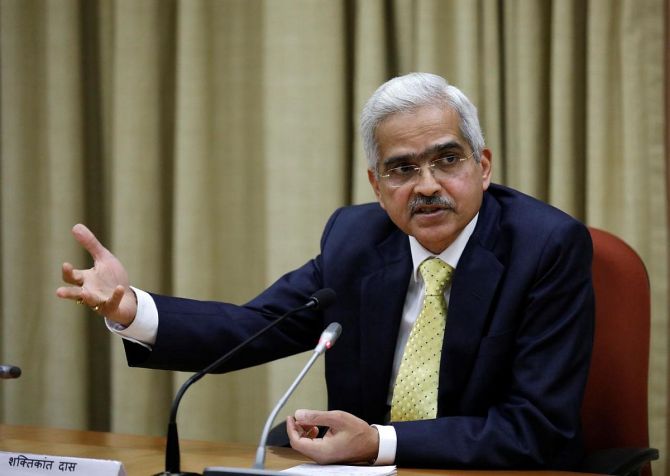The Reserve Bank of India (RBI) on Friday kept interest rates on hold while assuring to maintain support for reflating the economy by ensuring ample liquidity to manage the government's near-record borrowing.

The six-member Monetary Policy Committee (MPC) voted to continue with the accommodative stance as long as it is necessary to revive growth and mitigate the impact of Covid-19 on the economy while ensuring that inflation remains within the target, Governor Shaktikanta Das said.
While the Union Budget 2021 laid down an expansive fiscal strategy over the medium term to strengthen the growth engine in the economy, the RBI affirmed its support to such a plan through appropriate monetary tools.
To absorb higher government borrowings, the central bank provided retail investors a direct option to invest in government securities.
It also sapped some fund from banks by raising the Cash Reserve Ratio (CRR) and use the money for more targeted market operations.

The MPC, which cut borrowing costs by 115 basis points last year, kept the repurchase or repo rate unchanged at 4 per cent. Consequently, the reverse repo rate will also continue to earn 3.35 per cent for banks for their deposits kept with the RBI.
This is the fourth consecutive bi-monthly policy review to keep rates unchanged since they hit the pause mode in mid-2020 over inflation worries.
Das said all the six members of MPC were unanimous in their decision to keep rates on hold.
 With green shoots of recovery clearly visible, the RBI pegged GDP growth in the fiscal year beginning April 1, 2021 at 10.5 per cent, a tad lower than 11 per cent predicted by the government's Economic Survey last week.
With green shoots of recovery clearly visible, the RBI pegged GDP growth in the fiscal year beginning April 1, 2021 at 10.5 per cent, a tad lower than 11 per cent predicted by the government's Economic Survey last week.
The growth compares to an estimated 7.7 per cent contraction in the economy during the current fiscal ending March 31.
The outlook on growth, he said, has improved significantly with positive growth impulses becoming more broad-based and the rollout of the vaccination programme in the country auguring well for the end of the pandemic.
The economy had contracted by 23.9 per cent in the April-June period of last year and by 7.5 per cent in the following three months.
"... going forward, the Indian economy is poised to move in only one direction and that is upwards," Das said while unveiling the bi-monthly monetary policy.
On the prices front, the RBI kept retail inflation target at 5.2 per cent for March 2021 and 4.3 per cent in December 2021.
Das announced the restoration of CRR -- the amount of deposits lenders must set aside as reserves -- to 3.5 per cent in March and 4 per cent in May.
The cash returning to the central bank can be used by it for open market operations and other liquidity measures.
The developmental measures announced by the RBI included the inclusion of NBFCs in the on tap TLTRO scheme, the incentive to banks to lend to new MSME borrowers through a lower CRR requirement and the further deferment of capital conservation buffer.
The RBI governor said the economy's growth outlook had improved and that inflation was expected to remain less than the central bank's upper target of 6 per cent over the next few quarters.
"Given that inflation has returned within the tolerance band, the MPC judged that the need of the hour is to continue to support growth, assuage the impact of Covid-19 and return the economy to a higher growth trajectory," he said. "The RBI stands committed to ensure the availability of ample liquidity in the system and thereby foster congenial financial conditions for the recovery to gain traction."
The 27th meeting of the rate-setting MPC with three external members -- Ashima Goyal, Jayanth R Varma and Shashanka Bhide -- began on February 3.
This is the first meeting of the panel after the Budget 2021-22 earlier this week projected a nominal GDP growth rate of 14.5 per cent and fiscal deficit of 6.8 per cent for the financial year beginning April 1, 2021.
The MPC has been given the mandate to maintain annual inflation at 4 per cent until March 31, 2021, with an upper tolerance of 6 per cent and lower tolerance of 2 per cent.
On inflation, Das said it has eased below the upper tolerance level of 6 per cent for the first time during the Covid-19 period.
"Going ahead, factors that could shape the food inflation trajectory in coming months, including the likely bumper kharif harvest arrivals in markets, rising prospects of a good rabi crop, larger winter supplies of key vegetables and softer poultry demand on fears of avian flu are all indicative of a stable near-term outlook," he said.
As far as gross market borrowing of Rs 12 lakh crore in 2021-22 is concerned, he said the Reserve Bank, as the government's debt manager and banker, will ensure the orderly completion of the programme in a non-disruptive manner.
"In this context, we look forward to the continuance of the common understanding and cooperative approach between market players and the RBI during 2021-22 also," he said.
The RBI has also decided to defer the implementation of the last tranche of the Capital Conservation Buffer (CCB) of 0.625 per cent and also defer the implementation of Net Stable Funding Ratio (NSFR) by another six months from April 1 to October 1, 2021.











 © 2025
© 2025